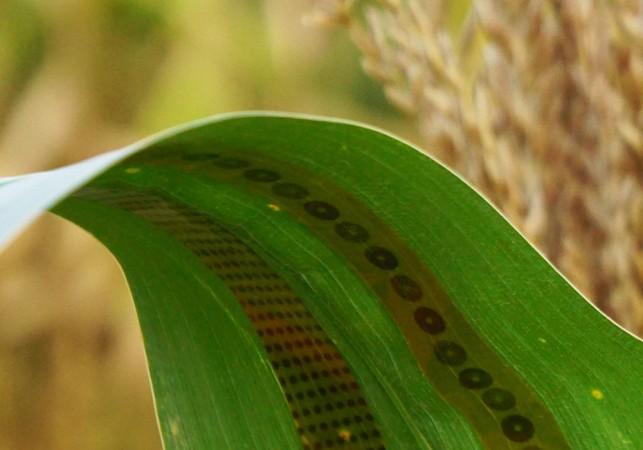
A team of scientists has developed some sort of tattoos for plants that are expected to provide new kinds of data to researchers and farmers. The plant tattoos, which are actually wearable tiny sensors, can be attached to plants to take real-time, direct measurements of water use in crops.
Dubbed "plant tattoo sensor," the tool that make these water measurements possible is a graphene-based microscale sensor that can be taped to plants. The researchers described the "method for patterning and transferring graphene-based nanomaterials" to create these flexible sensors in a study, published recently in the journal Advanced Materials Technologies.
The main of the researchers was to make sensors that are cheaper but high performing. To make that happen, they developed a process for fabricating intricate graphene patterns on tape, with the first step being the creation of indented patterns on the surface of a polymer block, either by moulding or 3-D printing.
Engineers, working in the research, then applied a liquid graphene solution to the block to fill the indented patterns. They also used tape to remove the excess graphene, and then used another strip of tape to pull away the graphene patterns, creating a sensor on the tape.
According to researchers, the process can produce precise patterns as small as 5 millionths of a metre wide, or a 20th of the diameter of the average human hair. Researchers said that the tiny size of the patterns increases the sensitivity of the sensors.
For plants, researchers made the sensors with graphene oxide, a material very sensitive to water vapour that can change the conductivity of the material, allowing scientists to accurately quantify and measure transpiration (the release of water vapour) from a leaf.
"The most exciting application of the tape-based sensors we've tested so far is the plant sensor," Liang Dong, a professor of electrical and computer engineering at the Iowa State University and the lead author of the paper, said in a statement.
"The concept of wearable electronic sensors for plants is brand new. And the plant sensors are so tiny they can detect transpiration from plants, but they won't affect plant growth or crop production," Dong said, adding that plant sensors have been successfully tested in lab and pilot field experiments.
In addition to water usage measurements, the technology is also expected to "open a new route" for a wide variety of applications, including sensors for biomedical diagnostics, checking the structural integrity of buildings, monitoring the environment and testing crops for diseases or pesticides.

















